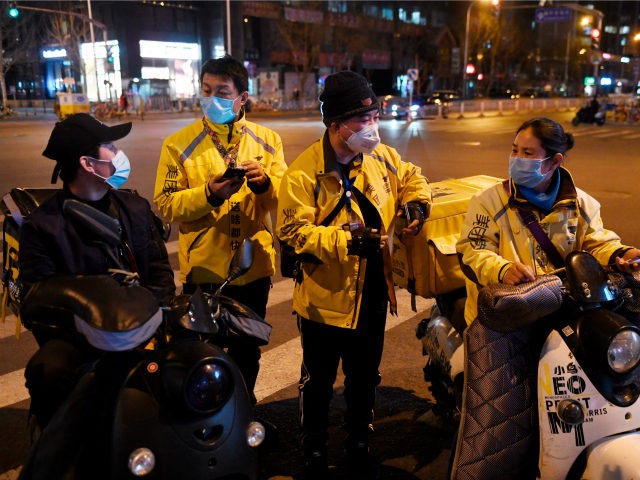Chinese Communist Party media revealed a boom of 79 cases of Chinese coronavirus discovered in Beijing as of Sunday, insisting the situation would not become a “second Wuhan” despite the nation’s capital going into “wartime” mode against the pandemic.
Communist Party dictator Xi Jinping declared victory against China’s outbreak during a visit to central Wuhan, where the pandemic originated, on March 10. Leaked government documents suggest the outbreak began there in November; a Harvard study published last week suggests the virus may have been spreading in the city as early as August. A day after Xi’s visit, the World Health Organization (W.H.O.) branded the situation a pandemic, meaning the disease threatened every region on earth.
China has continued to struggle with its initial wave of coronavirus cases since Xi’s visit, particularly in northern Jilin and Heilongjiang provinces, while insisting that it has engaged in the world’s most successful containment measures. Even in Wuhan, locals reported the death of yet another Wuhan doctor on the front lines of fighting the outbreak in early June.
On Monday, the state propaganda newspaper Global Times similarly insisted that the large number of Beijing cases did not discredit its months-long campaign to declare itself the world’s preeminent medical power.
“The sudden spike in the capital city came after China experienced a short period of calm and it has triggered mounting concerns over a possible second wave of the virus,” the Global Times admitted, noting that the epicenter of the spread once again appears to be a food market. In Wuhan, authorities initially blamed a “wet market,” an outdoor area with in-person animal butchering, for the outbreak, though Chinese officials later claimed, without evidence, that the U.S. military was the source of the virus.
In Beijing, officials believe, for now, that the outbreak began at the Xinfadi wholesale market, which they have since shut down.
“Beijing immediately shut down the beef and lamb trade center of wholesaler Xinfadi Market and Jingshen sea food market in Fengtai District where Tang had visited. All relevant people including customers and meat dealers have undergone nucleic acid tests. In total, six major wholesale markets in Beijing suspended, or partially suspended,” the Global Times reported last week.
By Monday, the newspaper announced that every neighborhood in Beijing was now in “wartime” status, not just Xinfadi, and that an army of 100,000 social workers had been deployed to screen hundreds of thousands of people for the virus.
“Beijing has entered an extraordinary period. We should draw lessons from the pain, remain alert against the risk of the epidemic at all times and resolutely cut off the spread of the virus,” Beijing city government spokesman Xu Hejian said, according to the People’s Daily, the official newspaper of the Communist Party of China. “All personnel in the Xinfadi market and nearby residents will receive nucleic acid tests and be put under medical observation. Those who have had close contact with workers at the market since May 30 should take the initiative to report to their employers and communities, and go through testing.”
While state media operations claimed that only a “partial” lockdown had been implemented in areas closest to where the regime believes infections began, video footage and other reports from Beijing indicate that large-scale quarantine measures have begun.
“Twenty thousand to thirty thousand people are being taken away by buses. They will be isolated at hotels,” an unidentified person filming authorities corraling people said in a video shared by the anti-communist newspaper Epoch Times.
Locals told the newspaper they feared the outbreak was “out of control” of the government was openly discussing it.
People from Xinfadi, Beijing rounded up for quarantine, probably on Jun 14, after new #CCPvirus outbreak. It took a whole day to take all those people away. 7 hotels were requisitioned as quarantine sites.
Click here for more updates: https://t.co/fSwmxEsPYp
#COVID2019 pic.twitter.com/ePhAcJQbv7— Jennifer Zeng 曾錚 (@jenniferatntd) June 15, 2020
Contradicting independent reports and images from Beijing, the Global Times on Monday insisted that the situation is not a “second Wuhan.” In that city, during the height of the outbreak, police welded civilians’ doors shut to prevent them from going outside, likely killing some of starvation. Reports surfaced of quarantined prisoners committing suicide and trapped special needs persons dying when their families, who took care of them, were quarantined separately, leaving them helpless and alone.
Zeng Guang, a chief epidemiologist of the Chinese Center for Disease Control and Prevention (CDC), told the Global Times that only those who had visited the suspect market were being quarantined and “unlike the previous situation when a whole city would upgrade the risk level when a case was spotted, which may have huge impact on people’s daily lives, the current risk alert applies to related communities.”
“Zeng from CDC agreed that Beijing will not become a second Wuhan, with no need to shut down the city, and the virus will not spread to other places across the country. The epidemic in Beijing is more of a short-term outbreak,” the Global Times added.
Sun Chunlan, China’s vice premier who visited Wuhan weeks before Xi did, appeared more concerned than Zeng, according to remarks the state propaganda outlet published on Monday. Sun reportedly made the remarks at an unspecified meeting on Sunday.
“The risk of the Beijing epidemic spreading is very high, warned Chinese Vice Premier Sun Chunlan, who urged officials to adopt decisive measures to curb the epidemic,” the Global Times reported. “She stressed the necessity of detecting and controlling the source of infection in a more proactive manner.”
Follow Frances Martel on Facebook and Twitter.

COMMENTS
Please let us know if you're having issues with commenting.